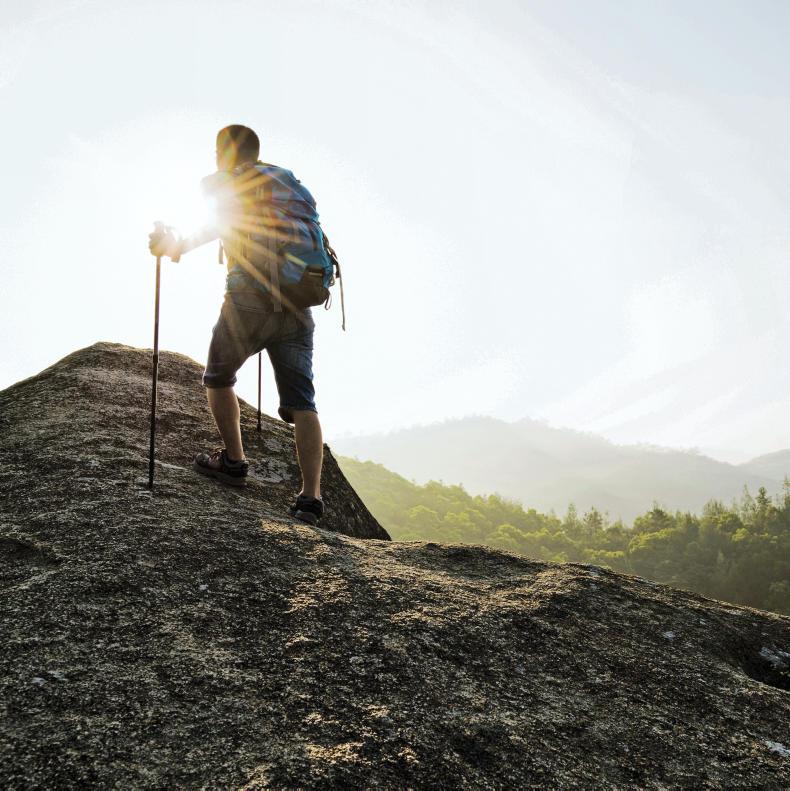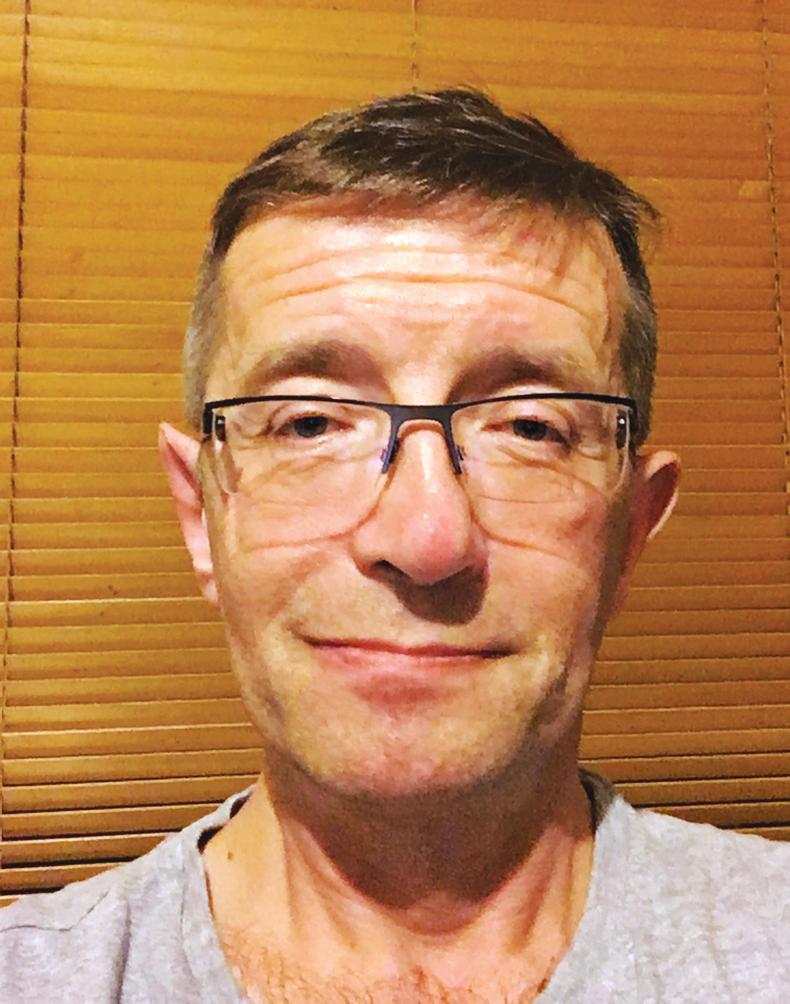James McShane (right) is very open about where he’s at. With Life Ring not bound by any anonymity principle, he is free to talk openly about his addiction and recovery.
He is grateful to Alcoholics Anonymous, though, for initially finding recovery with that 12-step programme in May 2007.
“I quit drinking with AA over nine years ago and stopping drinking has been totally the best decision I’ve ever made in my life,” he says.
He was in AA for two years and a bit sceptical of the idea of any other programme working for him, but after being introduced to Life Ring meetings by a friend of his brother’s, he made the switch, sustaining his recovery all through.
“Some people in Life Ring also attend AA meetings and we’re totally okay with that,” he says. “There is no set way to stay sober. There’s freedom for everyone to make their own choices as they concentrate on recovery.”
RESTORES SELF-ESTEEM,
SELF-BELIEF & SELF-CONFIDENCE
Achieving sobriety showed him that there was hope and self-esteem for him again, he says.
“Addiction will rob anybody of self-esteem, self-belief and self-confidence. Long-term sobriety will give you all three back.”
So, how does Life Ring differ from the long-established 12-step programmes?
“It gives the person who goes to meetings personal responsibility. It’s all about decision making, choice making, making the next right decision,” he says, “whereas 12-step programmes will focus on the powerlessness of addiction and the need to hand over personal power to an unseen entity whether it’s a higher power or whatever.
“That works for a lot of people and that’s fine but what we do is we focus on the person themselves and their own sobriety.”
The cornerstones of Life Ring are the three Ss: sobriety (meaning abstinence), secularity (meaning religion is not involved) and self-help.
James feels that the Life Ring programme made him engage more pro-actively with his own recovery.
“It worked for me, asking myself what can I do now to stay sober, what can I do in the next week to stay sober, what did I do last week to stay sober, what didn’t work, what changes do I need to make to continue on to motivate myself, to keep it going?”
HOW LIFE RING MEETINGS WORK
Life Ring meetings involve a convener.
“It’s been compared to an aftercare service from psychiatric hospitals. Someone with experience of recovery chairs the meeting. We all come in, sit down and talk about how we’ve been in sobriety and what’s facing us in the forthcoming week, and a discussion can come from that. It’s different to AA where people take turns at sharing.”
A lot of common topics come up in the discussions, he says.
“Most of the time it’s isolation, boredom, family members, relationship issues, money worries … Sober people still have problems. Just because you stop drinking doesn’t mean that life problems go away.
“What Life Ring offers, though, is the knowledge that there is a way out if they don’t drink and if they take charge of their own sobriety.”
If people need a therapist or doctor they are advised to see one by Life Ring. The discussion at meetings is kept focused, he says.
“The talk has to be about sobriety and recovery. If people attending go into relationship issues, we’d say you need to talk to somebody else about that, such as a counsellor. We make the point that we’re not a place where you can offload or dump your emotional stuff. There is a certain amount of leeway but the convener would be conscious of the limits.”
“We’re not doctors,” James says, “we’re not going to tell you yes or no to medication, we would say speak to the people who know about those things. We don’t frown on the use of anti-depressants or anti-booze pills to help with alcohol cravings or stuff like that. We say if it’s working and if you’re using medication responsibly, that’s okay.
“Also, we don’t offer therapy. However, the convener would be experienced enough to recognise that certain people would perhaps need therapy and we would recommend professional help in that situation. We give practical tips within a certain boundary. We don’t offer medical or therapeutic advice because we are a peer-led group rather than a therapeutic or counselling group.”
BRANCHING OUT
Life Ring started in California 10 years ago by a group of recovering addicts, including Martin Nicolaus, author of Empowering Your Sober Self. It was first established in Dublin in 2009. There are currently meetings in Dublin, Belfast, Navan, Longford and Tralee.
“Life Ring has grown slowly since then. The first outside meeting was in Abbey Street, then we went into St Patrick’s hospital in Dublin, then into St John of God’s. It has since branched out more as people who have experienced Life Ring in Dublin have brought the meetings to their own areas.”
James believes that people need the support of a group to stay sober.
“If you try on your own you’ll succeed for a while then other things kick in, such as environmental factors, you’re still feel bored/isolated, have family issues/money issues but you’re sitting there thinking: ‘Now I’m sober but life is still crap.’ At meetings, we would share from our own experience of how we coped and stayed sober and that would help others.”
Preparing for social occasions
Slips often happen, he says.
“It’s part of addiction but it can lead to self-awareness. We focus on the learning experience of slips and relapses and we try to remove the whole guilt and shame aspect. You ask yourself what you can learn from it and what you do to make sure that it doesn’t happen next time.”
Weddings and social occasions can be particularly challenging for those with addictions, he says, and you have to plan how you will cope on the day.
“It’s asking people to stop and think how a particular situation like going to a wedding is going to affect you rather than coasting, rather than using the well-known Irish phrase: ‘Ah sure I’ll be grand.’
“Nobody is going to ‘be grand’ in those situations, so you have to come up with a plan (to stay sober). People have to work out some sort of system that will get them out of trouble should the need arise.”
Life Ring is generally for those seeking recovery from alcohol and drug addiction (illegal/prescription drugs).
“Gambling needs more specialised help,” James says, “as it’s more a behavioural addiction rather than substance abuse addiction, but the two often go together.
“People with food issues would need more specialised help as well. The bulk of our talk would be about alcohol and drug abuse.”
FIRST MEETING DAUNTING BUT
LED TO SUCCESS
James admits that going to his first meeting was a very daunting experience.
“It takes a certain amount of nerve to walk in the door but what I got out of going was that ‘yes I can do this’ because I am a human being and have a certain amount of self will. I got myself into this problem and I need to get myself out of it and there is help available to me to get out. There is hope and self-esteem for me again.”
There is no buddy or sponsor system in Life Ring. However, members are available to each other if needed.
“We’d have an online and offline network of sober friends we could contact, but we don’t take responsibility for somebody else’s sobriety.
The whole ethos of Life Ring is about personal responsibility. You don’t hand that responsibility over to anyone else.”
Martin Nicolaus’s book Empowering Your Sober Self spotlights the theory behind the practice, he says.
“It’s not a ‘how to get sober’ book. It outlines his philosophy, which is that within an addict there’s a sober person screaming to get out. It’s all about empowering that sober self and making him stronger than the addictive self.”
Staying away from drugs and alcohol has made life a lot simpler for James.
“It made stress easier to cope with because people in addiction think that drugs and alcohol are their friends and that is the only way they can cope.
“Basically, what’s happening there is they want to get out of their head, away from their own problems, but once they come out of their drunk or drug high, the problems are even worse.
“Life Ring gave me the forum to work out these problems on an individual basis because I saw people who went through what I was going through and how they coped.
“I then put their strategies to use for me and it worked and then I passed it along to the new person who came into the room.”
It also allowed James to learn to drive at the age of 51.
“It took me a year to learn,” he says. “If I was still drinking, none of that would have come into the equation because when you’re drinking it’s all about ‘what do I do now to get my next drink?’ Sobriety is all about ‘what do I do to keep this sobriety going’.”
INFORMATION
There are Life Ring meetings in Dublin, Belfast, Navan, Longford and Tralee. There is also an online meeting available. Life Ring is a non-profit organisation. A How LifeRing Works video can be viewed on the www.dublinlifering.com website. See also www.lifering.org






SHARING OPTIONS